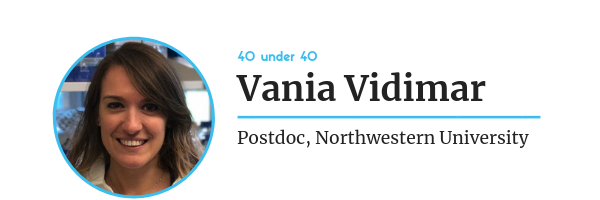The Ras protein is the black hole of cancer research. Enigmatic, elusive and over-active in the deadliest of cancers, scientists have tried to understand its mysterious ways for decades. Dr. Vania Vidimar is part of lab at Northwestern that discovered a naturally-occurring enzyme that may just be its kryptonite. View Halo Profile >>
Tell us about your research?
My research focuses on therapeutically targeting one of the most elusive targets in cancer research, namely Ras. Our lab has discovered a bacterial protease we call the Ras/Rap1-specific protease or RRSP that has the natural activity to site-specifically cleave Ras and its close homolog Rap1.
My research focuses on therapeutically targeting one of the most elusive targets in cancer research, namely Ras.
Using cellular biology techniques as well as animal models, I found that RRSP exhibits potent anticancer activity against three out of the fourth deadliest, Ras-dependent cancers worldwide, including colorectal, pancreatic and triple-negative breast cancers. These results pave the way for advancing RRSP into therapeutic clinical development.
Can you explain that to a non-scientist?
More than 30% of all human cancers have defective, permanently active Ras proteins that constantly signal cancer cells to grow without any sort of control. One of the greatest challenges in cancer treatment has been the development of effective Ras-targeting drugs since no successful therapies that target Ras are in use in the clinic.
One of the greatest challenges in cancer treatment has been the development of effective Ras-targeting drugs since no successful therapies that target Ras are in use in the clinic.
Our lab discovered a naturally-occurring enzyme that inhibits Ras. My research demonstrated that this enzyme further blocks tumor growth, thus being a potential candidate for clinical studies.
How could it someday impact patient lives?
Ras-driven cancers are among the most difficult to treat and highly chemoresistant tumors, leaving patients with extremely low survival rates. Each year, there are 1.7 million new cases of cancer. Of these, a high percentage of pancreatic, colorectal and lung cancers harbor a mutation in the RAS genes. We established proof-of-concept that RRSP, because of its unique mode of action, has the potential to take anti-Ras therapy to the next level.
We established proof-of-concept that RRSP, because of its unique mode of action, has the potential to take anti-Ras therapy to the next level.
By improving RRSP targeting to diseased tissues, we might be able to increase the therapeutic success of Ras inhibition and benefit patients with Ras-addicted tumors.


